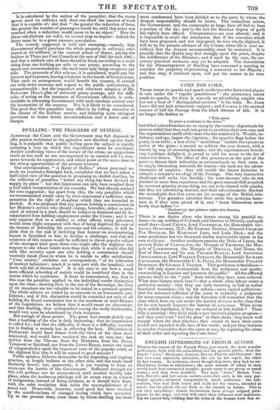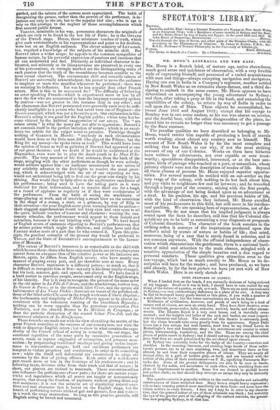ENGLISH IMPRESSIONS OF FRENCH ACTORS.
DURING the season of the French Plays, just closed, the most popular performers, both with the subscribers and the general public, were the female "stars," Mesdames ALBERT, DOCRE, PLESSY, and DEJAZET : the last two were especially attractive, the one by her esprit, the other by her beauty. As actresses, clever though they were, they had no ex- traordinary claims to admiration ; the same amount of' talent in men would have been accounted nought: people came to see pretty or noted women, and they were gratified. The male "stars," Messrs. VER- NET, Bourn, and LEVASSOR—actors unrivalled each in his own par- ticular sphere—attracted comparatively small audiences : the sub- scribers, who had their boxes and stdls for the season, attended as usual ; but the public did not flock to the theatre as before. This is not very surprising: female fascinations have always reigned para- mount on the stage, and ever will exert their influence over audiences. Yet we cannot help wishing that the wiles of the woman were fess re-
garded, and the talents of the actress more appreciated. The habit of
in- jurious the person, rather than the powers of the performer, is - not only to the art, but to the popular idol also;. who is apt to rely on this prestige, to the neglect of those accomplishments which first secured public favour. VERNET, inimitable in his way, personates characters the originals of which are only to be found in the low life of Paris : he is the Osrrenu of the French stage. Hence, those miniature touches of truth, which give such verisimilitude to his representations and point to his drollery, were lost on an English audience. The clever mimicry of LEVASSOR, too, required a knowledge of the subjects of his mimetic skill. But BOUFFE takes a wider scope ; he appeals to the common sympathies of human nature, by his powerful expression of passions and emotions that all can understand and feel. Distinctly as individual character is de- lineated, and minutely as its idiosyncracies are preserved in every one of his personations, so strongly marked are the distinguishing traits of each passion that the truth of the resemblance becomes sensible to the most casual observer. The consummate skill and versatile talents of Botrn4 are universally acknowledged: his power to move the audience to laughter or tears was manifest whenever he performed : there was no resisting its influence. Yet was he less popular than other French actors. How is this to be accounted for ? The difficulty of following an actor speaking French—which is experienced more or less by all save the few who are accustomed to hear the language constantly spoken by natives—was not greater in this instance than in any other ; and the characters that BOUFFE personated were generally such as to be suffi- ciently intelligible to a person who had never been out of England—the Gamin excepted, which was yet a favourite part. Our explanation is this. BOUFFE'S acting is too good for the English public ; whose taste has be- come vitiated by the habitual exaggeration of our actors. The " ars celare artem " is what the many are not able to appreciate : BOUFFE'S art conceals itself in the perfect imitation of nature ; which is an excel- lence too subtile for the vulgar mind to perceive. Partridge thought nothing of GARIUCK in Hamlet : "anybody in such circumstances would have done as the little man did who played the Prince ; but the King for my money—he spoke twice as loud." This would have been the opinion of boxes as well as galleries if BOUFFE had appeared at one of our great theatres: and we doubt if he would be understood at the Haymarket, even were he to play the dumb youth in Le Muet D'In- gouville. The very manner of his first entrance, from the back of the stage, mingling with the other performers as though he were nobody, would militate against him : an audience accustomed to see actors of any celebrity advance to the foot-lights to receive the usual greet- ing, which is acknowledged with the air of one expecting no less, would not understand being left to find out the great star simply by his shining. Nor would they be fully alive to the unobtrusive excellence of his performance ; being used to have the telling parts as it were italicized for their information, and to receive their cue for a laugh or a round of applause as regularly as if they were confederates of the performers. From the habit of seeing the machinery of stage-playing at work, and of receiving a smart blow on the sensorinm In the shape of a stamp, a start, or a grimace, by way of fillip to their attention—for your English actor gives warning before he strikes— their sluggish apprehensions would not keep eyes and ears open to all the quiet, delicate touches of humour and character : wanting the cus- tomary stimulus, the performance would appear to them insipid and colourless, because it was not bristling with "points." We have heard of English actors of eminence objecting to BousTE's performances, that he misses points which might be effective ; and critics have said that FannEN makes more of a part than he who created it. Upon this prin- ciple, the gaudiest colourist of the present day would be preferred to TITIAN, and the blare of DONIZETTIS accompaniments to the harmo- nies of MOZART.
The extent of BOUFFE'S resources is as remarkable as the skill with which he uses them : those who have only seen him in one or two characters cannot form an adequate idea of his creative power or his imitative art. Herein, again, he differs from English actors; who have mostly one manner of playing every part, and are therefore seen at once. Every character BOUFFE represents is a different person ; so much so, that it is difficult to recognize him at first : not only is his dress totally changed, but his look, manner, gait, and speech, are altered. We have found it a hard matter to convince people, accustomed only to the English stage, of his identity. Nor is it easy to recognize the person of the same actor in the old miser in La File de l'Avare,' and the mischievous, restless boy, Le Gamin de Paris; or in the clownish idiot Cesar, and the spruce old balletmaster of Les Vieux Peches : there are no traces of the polished ad- dress of the blind artist Clermont in the rough workman L' Oncle Baptiste; the bonhommie and simplicity of Michel Perrin appear to be almost in- consistent with the venomous cunning of the hunchback Rigaudin ; nothing can be more opposite thin the garrulous centenarian "'ire Turlututu, and the shrewd Doctor in Le Midecin de Campagne ; or than the pathetic distraction of the crazed father Pere Job, and the mercenary adulation of Le Beilficiaire. These remarks are made not with the view of exalting the merits of the great French comedian at the expense of our countrymen, nor with the wish to disparage English actors ; but to show in what consists the supe- riority of the French school of acting in comedy. On our stage, the continual repetition of the same parts by successive generations of actors, tends to repress originality of conception, and promote man- nerism; by perpetuating traditional readings and giving undue impor- tance to conventional usages : bold and ambitious performers are tempted to violate propriety and consistency, in order to do something new ; while the timid and deferential are constrained to adopt old customs by the fear of giving offence. Each actor of a well-known part treads more or less in the footsteps of his predecessors ; and in following them, deviates alike from their track and that of nature : in short, our players are trained to trammels. These conventionalities also influence the performance of new parts ; for there are certain stage- tricks and regulations which all actors are taught or unconsciously acquire, that cramp the freedom of aspirants without giving them any real assistance : it is not the mimetic art of simulating natural emo- tions and real character that is learnt on the English stage, but the knack of performing certain tricks of gait and gesture, face and voice— in a 'word, the stage mannerism. So long as this practice prevails, will English acting be forced and unnatural.



























 Previous page
Previous page